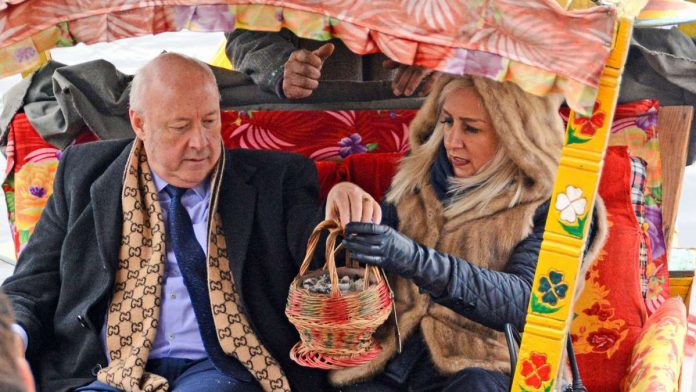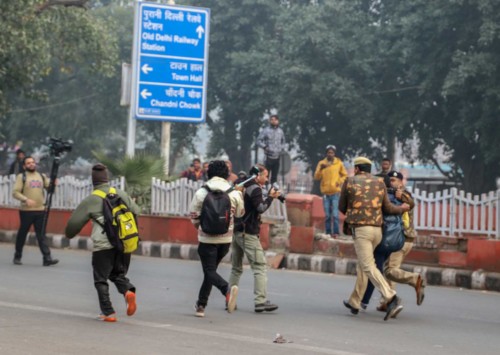Global leaders complicit in murder of democracy in J&K

Eyes Wide Shut: International diplomats on a ‘sanitised’ sight seeing tour of Jammu & Kashmir earlier this year
A year of flagrant violation of human rights in Jammu & Kashmir has gone pretty much unnoticed globally as political leaders, self-proclaimed human rights champions, continue to look the other way.
On August 4, on the eve of first anniversary of an unprecedented crackdown on ordinary life in Jammu and Kashmir, a panel of independent experts, appointed by the United Nations, expressed grave concern over the alarming situation of human rights violation in Jammu & Kashmir. The experts called on India and the international community to take urgent measures to deal with the ‘‘alarming human rights situation in the territory’’. ‘‘If India does not take any real and immediate action to resolve the situation, fulfill its obligations to investigate historical and recent cases of human rights violations and avoid future violations, then the international community should engage,” said the experts in a news release.
Though mandated by the UN, the report said it did not reflect the views of the international organisation. Nonetheless, the report was significant in view of several facts. Most crucially, this was the first such international response in the year since the controversial decision of the Indian government to abrogate Article 370 of the Indian Constitution, put thousands of activists and politicians in prison, impose a total news blackout and an indefinite curfew and cut off not just internet but even telecom services, creating a vacuum from which the cries of the people of the state could not be heard by anyone even in other parts of the country, let alone rest of the world.
Despite the media blackout, global media was full of reports about the enormity of the measures and the repercussions for the people of the state, which was also split and downgraded to a union territory or federally administered. However, besides the media and human rights organisations, the rest of the world, notably the western world that has always considered itself to be a champion of human rights, did not react at all, preferring to look the other way while democracy and human rights in the country were crushed beyond recognition. At first, they tried to seek refuge behind the Indian government’s statement that the drastic measures were needed as the state and the country had been facing terrorism and that the decision on J&K was taken to strengthen the security and stability.
Indeed, that was the response of French President Emmanuel Macron to a question from journalists at last year’s G7 Summit in Biarritz about the French position on Kashmir, over three weeks after the move. With a tepid call on the Indian government to respect human rights, Macron then quickly parroted the official line from New Delhi about stability and threats of terrorism. By then, ‘laissez faire’ had truly become the default response of the global political leaders to the situation in J&K.
Indeed, the deafening silence over the issue became even more palpable a few months later when the Indian government mounted an all-inclusive junket and sight-seeing tour for senior diplomats of key countries, posted in New Delhi, to visit the dismembered state and see some selected and highly sanitised sights of the region that continued to simmer. After a bit of initial hesitation, several diplomats of the European Union joined in and were part of this PR exercise that made a complete mockery of the EU’s position on human rights.
Now, it has been a full year since the total lockdown began in Kashmir. Hundreds, possibly thousands, of political activists, journalists as well as social leaders of the state continue to be locked behind bars, including the last chief minister of a united J&K Mehbooba Mufti. Though there is some semblance of normalcy, but mobile internet is not yet back on and thousands of extra troops sent by New Delhi continue to maintain their boots on this ‘paradise on the Earth’.
It is practically impossible to fathom the real reasons behind the silence of the ‘leaders of the free world’ on the blatant murder of democracy in J&K. Cert that they find the current dispensation in India, notably Prime Minister Narendra Modi to be more amenable to placing multi-billion dollar orders for weapons purchase or open up other business opportunities to allow the multinationals a slice of the lucrative Indian market. It is perhaps a just reflection of today’s world of mercantile politics that an Angela Merkel or Macron would not blink twice before sacrificing ‘long-cherished principles and values’ for a few dollars more in their countries’ economies. After all, both Merkel and Macron have been giving a particularly tough time to Turkish President Recep Erdogan or Polish President Andrezj Duda over violations of human rights in their countries.
Could it be that events that occur closer to home are more difficult to ignore for these leaders or has doing business at any cost become the new normal in today’s world?










